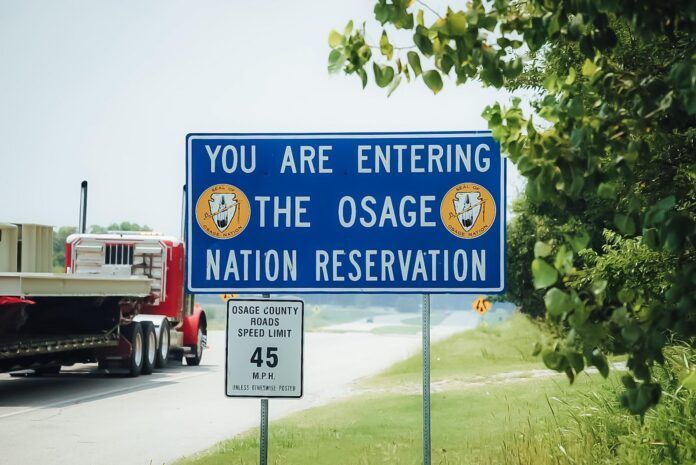Lawyers on all sides of Phillips case scheduled to be in court for a status hearing on Sept. 8.

Written by Louise Red Corn
The district court judge for Osage County has ruled that the Osage Nation’s reservation no longer exists, but his decision is merely the first step in what is likely to be a lengthy legal battle.
Judge Stuart Tate made the ruling in a criminal felony case involving Dustin Phillips, a member of the Cherokee Nation who is charged with kidnapping, domestic assault and protective order violations that occurred in Skiatook in early 2019. Phillips’s lawyers argue that federal courts, not the state, have jurisdiction in the case because Phillips is Native American and the crime occurred on the Osage Reservation.
Osage Nation Attorney General Clint Patterson said Aug. 31 that he and other attorneys involved in the case have a meeting set for Sept. 1 to decide their course of action. Because it entered the case only as a friend of the court, the Osage Nation has no avenue to appeal on its own behalf, but Phillips does.
“We knew this case was not going to be won on the district court level and an appeal was coming from either side,” Patterson said. “This is just one more necessary step towards our end goal of getting our reservation back for all Osages.”
If Phillips and his attorneys decide to appeal, they would likely file an interlocutory appeal, which is an appeal made before a case is finally decided – before Phillips is sentenced or found innocent of the charges against him. Such an appeal would go to the Oklahoma Court of Criminal Appeals; from there, it would go to the U.S. Supreme Court. If he decides not to appeal, the issue would die and the Nation would have to find another case to piggyback.
Lawyers on all sides of the Phillips case are scheduled to be in court for a status hearing on Sept. 8.

McGirt, Irby: At odds
The case appears poised to be the test case that could ultimately decide the Nation’s reservation status in the wake of two major federal court rulings.
One of those rulings, a 2010 decision by the 10th Circuit Court of Appeals in Osage Nation v. Irby, opined that the reservation had been disestablished and that tribal members who lived within the historic boundaries of the reservation were not exempt from paying state income taxes.
The Irby decision was a huge setback for the Nation, and because it is legally barred from litigating an issue that has already been decided, it has been forced to enter cases as a friend of the court, or amicus.
The other case is McGirt v. Oklahoma, a U.S. Supreme Court case from 2020 that declared the Muscogee (Creek) Nation reservation still exists because the U.S. had never explicitly disestablished it.
The McGirt case reversed more than a hundred years of prosecutorial practice in Oklahoma, shifting thousands of criminal cases to tribal and federal courts instead of state courts as they had been previously: What had long been assumed to be state turf had been redefined as Indian Country, including a good portion of Tulsa. The Oklahoma Court of Criminal Appeals later expanded that territory to include the reservations of the Five Civilized Tribes.
The state responded by describing the change as cataclysmic and that the sky was falling, but Supreme Court Justice Neil Gorsuch, who wrote the majority opinion, was withering in his criticism of Oklahoma’s arguments: “The magnitude of a legal wrong is no reason to perpetuate it.”

Broken promises must be clear
At the heart of the McGirt decision, Gorsuch wrote that Congress has to explicitly disestablish a reservation or it didn’t happen – a ruling that is at odds with Irby, which confessed that while Congress had never expressly disestablished the Osage reservation, it appeared to intend to disestablish it by passing the Oklahoma Enabling and Osage Allotment acts, the latter of which followed quickly on the heels of the former in June 1906.
“…[I]t’s no matter how many other promises to a tribe the federal government has broken. If Congress wishes to break the promise of a reservation, it must say so,” Gorsuch wrote. He also excoriated Oklahoma in McGirt for arguments that echo the pitches in the Phillips case regarding the Enabling Act, demographic changes in Osage County and other statements.
In his ruling, Judge Tate acknowledged that neither the state Enabling Act nor the Osage Allotment Act expressly disestablished the reservation but he wrote that when taken together they “strongly suggest” that Congress intended disestablishment.
“The Irby court found, as does this court, that the Osage Allotment Act and Oklahoma Enabling Act are ambiguous as to disestablishment of the Osage Reservation,” Tate wrote. “The Oklahoma Enabling Act provide that the Osage Reservation shall remain separate ‘until the lands in the Osage Indian Reservation are allotted in severalty,’” and the Allotment Act passed 12 days later.
“This legislative history strongly suggests that Congress intended to disestablish the Osage Reservation with the passage of the Osage Allotment Act. At the very least, the two Acts, when considered together, render Congressional intent as to the disestablishment of the Osage Reservation ambiguous.”

How the loss came down was unexpected
Patterson said that part of Tate’s ruling, citing the two acts from 1906, was unexpected.
“I wasn’t surprised we lost at the District Court level, but I was surprised by how we lost,” he said.
Osage Congressman Billy Keene, an attorney, was confounded by Tate’s ruling. “He seems to rely heavily on Irby but the new test is McGirt,” Keene said. “It’s much simpler and concise. It has to be a clean, unambiguous act to disestablish. ‘Strongly suggest’ – that’s not the McGirt standard.”
In his amicus brief for the Nation, attorney Eugene Bertman said the same: “McGirt does not mince words: There’s only one step –the text of the statute. The United States Supreme Court explains that any use of extratextual considerations outside the statute passed by Congress is mistaken …
“Turning to, particularly, to the Irby decision and looking at it through the lens of McGirt shows the stark changes to the rule on reservation disestablishment. Under McGirt, Irby would have come out differently.”

In McGirt, Gorsuch’s majority opinion is dismissive of state claims that Congress approved allotment acts as the first step toward disestablishing reservations – an argument made by the state in the Phillips case, too.
That may have been the plan, Gorsuch wrote, but “just as wishes are not laws, future plans aren’t either. Congress may have passed allotment laws to create conditions for disestablishment. But to equate allotment with disestablishment would confuse the first step of a march with arrival at its destination.”






